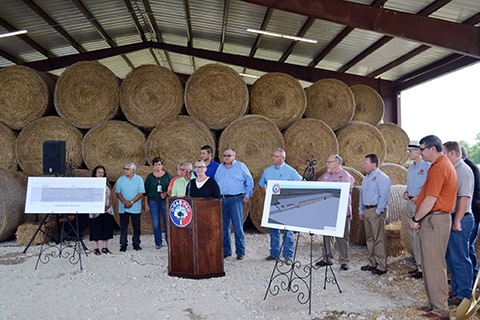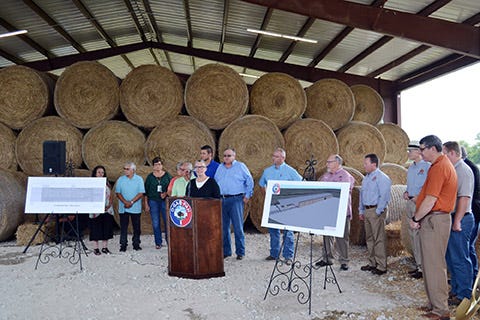University helping Quapaw Tribe build processing plant
Meat processing plant in Oklahoma expected to be operational by May 2017.
December 8, 2016

The Quapaw Tribe is building a meat processing plant near Miami, Okla., and faculty from the University of Arkansas Dale Bumpers College of Agricultural, Food & Life Sciences and School of Law are collaborating to assist in the design and construction of the facility.
The plant, expected to be operational in May 2017, will also provide University of Arkansas students with opportunities for experience and training.
 Janie Hipp, director of the Indigenous Food and Agriculture Initiative in the School of Law, speaks at the groundbreaking on Aug. 31. John Berrey, chair of the Quapaw Tribe and a 1991 U of A graduate, is to the right of Hipp, and H.L. Goodwin, Bumpers College professor and senior economist, is three spots to the right of Hipp. Photo by Anna McKibben
Janie Hipp, director of the Indigenous Food and Agriculture Initiative in the School of Law, speaks at the groundbreaking on Aug. 31. John Berrey, chair of the Quapaw Tribe and a 1991 U of A graduate, is to the right of Hipp, and H.L. Goodwin, Bumpers College professor and senior economist, is three spots to the right of Hipp. Photo by Anna McKibben
Harold Goodwin, a professor and senior economist for the Bumpers College, and Janie Hipp, director of the Indigenous Food & Agriculture Initiative in the School of Law, are helping with the business structure and completion of regulatory procedures. Mike Looper, head of the Bumpers College department of animal science, and Jason Apple, a professor of animal science, have provided input on design of the plant.
“It is envisioned there would be availability of the facilities for meat judging and grading training and also for food safety and meat processing training,” said Goodwin, who also works with the Indigenous Food & Agriculture Initiative. “Most likely, students involved would be from animal science and food science.”
Hipp said many Native American tribes have traditional cultural ties to food production.
“If you go back into individual tribes’ history on this continent, particularly before European contact, there were massive levels of food production,” said Hipp, who is a citizen of the Chickasaw Nation. “Tribes were not just hunting and gathering as ancient peoples on this continent; many tribes were involved in food production historically and remain deeply involved in food and agriculture today. Tribes all across the United States have a rich history in food production, and the Quapaw Tribe’s move into food processing and food science is an exciting next step.”
The plant will include a classroom, laboratory and test kitchen and is being designed to process up to 50 animals per week.
“We have great expertise in meat and food science at (the University of Arkansas) and are the center of expertise for tribal agriculture and food because of the Indigenous Food & Agriculture Initiative,” Goodwin said. “The proximity of the plant to Fayetteville (Arkansas, about 90 minutes away) makes it ideal for joint collaboration between the first U.S. Department of Agriculture-certified beef and bison processing facility owned by a Native American tribe and a land-grant university.”
“It’s about building an economy that’s agriculture based that will support local businesses and feed local people, we’re hoping,” said John Berrey, chair of the Quapaw Tribe, a 1991 University of Arkansas graduate and a member of the alumni association’s national board of directors. “Really, it’s about taking advantage of our region and all the agriculture that takes place in this region. It’s a business opportunity, for sure. It gives us an outlet for our beef products. It also gives us an opportunity to take other people's product and process it. It’s both community development and economic development for the tribe.”
The tribe has cattle and bison on a ranch outside Miami. The ultimate goal of the ranch is to raise, slaughter, process, package and ship its own products to local businesses and stores, including the tribe’s restaurants in Quapaw Casino and Downstream Casino Resort.
“Regaining our health in Indian Country is very important,” Hipp said. “You’ve got to have access to foods that are healthy and that are readily available. Investment in local infrastructure to make healthy foods more readily available is part of an important step in healthy food access. Without that infrastructure, tribes, which live in remote areas, are literally just waiting for that next truck to go by.”
The cost of construction is $1 million, with $800,000 provided by the U.S. Department of Housing & Urban Development in grant funds. The tribe has applied for additional grants to help pay for equipment at the plant.
The tribe is also partnering with Northeastern Oklahoma A&M College, Oklahoma State University and Missouri State University.
You May Also Like



